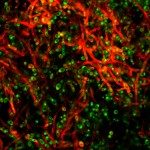Link to Pubmed [PMID] – 18803616
Link to DOI – 10.1111/j.1399-3062.2008.00347.x
Transpl Infect Dis 2009 Feb; 11(1): 83-8
Microsporidiosis first came to prominence as an opportunistic infection in patients with acquired immunodeficiency syndrome. Microsporidia are now emerging pathogens responsible for severe diarrhea during solid organ transplantation. Two main clinical entities can be identified: infection by Enterocytozoon bieneusi, causing diarrhea with limited treatment options; and infection by Encephalitozoon intestinalis, which may disseminate and usually responds to albendazole treatment. We describe here 2 cases of microsporidiosis caused by E. bieneusi in a renal and a liver transplant recipient, respectively, in whom complete clinical efficacy of a short course of fumagillin therapy was obtained. Long-term microbiological eradication was assessed using classical methods and monitored using a real-time quantitative polymerase chain reaction-based method. Both patients experienced drug-induced thrombocytopenia, which resolved after withdrawal of the treatment. We also review the 18 other previously reported cases of microsporidiosis in transplant recipients. In case of persistent diarrhea in solid organ transplant patients, microsporidiosis should be considered. Based on the present experience, treating E. bieneusi infection with 7 days of fumagillin therapy is adequate to eradicate E. bieneusi in this context.




